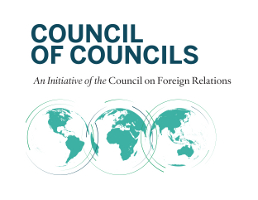
In New Report Card, Heads of Global Think Tanks Give Poor Grades to International Efforts to Tackle Pressing Problems
May 12, 2015—As countries around the world struggle to combat major global challenges from terrorism to climate change, a Council of Councils Report Card on International Cooperation finds that multilateral action on most of the critical transnational threats is sorely lacking. The Council of Councils, a Council on Foreign Relations (CFR) initiative, comprises twenty-six major international policy institutes and aims to facilitate dialogue on global governance and multilateral cooperation.
The survey asked heads of member think tanks to evaluate international efforts on ten of the most important issues in 2014: the global economy, nuclear nonproliferation, climate change, development, global health, trade, cyber governance, transnational terrorism, and both interstate and intrastate, i.e., internal, conflict. Global cooperation on eight of the ten issues received mediocre grades—C- or C+.
“Every era is characterized by a dominant threat to order, and for this era it comes from challenges that are global by nature,” said CFR President Richard N. Haass. “This report card identifies the areas in which cooperation is most needed and can produce the greatest results.”
When asked to prioritize these issues for 2015, respondents agreed that preventing and responding to interstate violence ranked number one. “The most urgent priority is to defuse the risk of great power conflict,” said Ferdinando Nelli Feroci, head of Italy’s Institute of International Affairs. The majority of participants cited Russia’s annexation of Crimea and ongoing tensions in Ukraine as a primary concern. “The year 2014 witnessed a serious conflict in Europe between two states, and tensions threatened to boil over in similar situations throughout the world. The global response to these crises has been unsuccessful, in some situations exacerbating the problem,” explained John Chipman of the London-based International Institute for Strategic Studies.
International efforts to prevent and respond to intrastate violence received the lowest grade, a D, despite being ranked as the second highest priority. “The international community and the UN have failed in our responsibility to protect citizens from intrastate violent conflict. The worst example is, of course, Syria,” argued Michael Fullilove, executive director of Australia’s Lowy Institute for International Policy.
The highest grade, a B-, went to nuclear nonproliferation efforts, reflecting progress in containing Iran’s nuclear program during 2014. “The unprecedented sanctions regime against Iran demonstrated that resolved, unified international action on the economic front can bring about significant diplomatic achievements,” said Amos Yadlin, director of the Tel Aviv-based Institute for National Security Studies. “2014 gave a good demonstration that nuclear proliferation can be effectively prevented,” he added.
Although participants gave a dismal evaluation of last year’s performance overall, they noted that expanding trade, managing global health, and mitigating climate change constitute the top three opportunities for breakthrough this year. “The good news is that despite the continuing global economic crisis in many parts of the world, protectionism has not spiked,” said Rohinton Medhora, of Canada’s Center for International Governance Innovation. Specifically, the Council of Councils considered the Trans-Pacific Partnership with Asia and the Transatlantic Trade and Investment Partnership between the EU and the United States as the agreements most likely to progress in 2015.
“Globalization has presented new threats—and new opportunities—which cannot be managed by any country alone” said Stewart M. Patrick, director of CFR’s International Institutions and Global Governance Program, which produced the report card. “They require international cooperation, but it can be hard to prioritize among important issues and grasp how the world is doing at addressing them. This report card is a unique initiative that helps policymakers around the world better understand trends in international cooperation and prioritize among them,” he explained.
Explore the interactive Council of Councils Report Card on International Cooperation at www.cfr.org/coc/reportcard.Learn more about the methodology here.
This report was made possible by the generous support of the Robina Foundation.
The Council of Councils is a CFR initiative connecting leading foreign policy institutes from around the world in a common conversation on issues of global governance and multilateral cooperation. The Council of Councils draws on the best thinking from around the world to find common ground on shared threats, build support for innovative ideas, and introduce remedies into the public debate and policymaking processes of member countries.
The Council on Foreign Relations is an independent, nonpartisan membership organization, think tank, and publisher dedicated to being a resource for its members, government officials, business executives, journalists, educators and students, civic and religious leaders, and other interested citizens in order to help them better understand the world and the foreign policy choices facing the United States and other countries. CFR takes no institutional positions on matters of policy.


